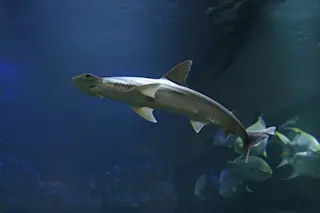Sharks are infamous meat-eaters. The ocean’s buffet of fish, crabs, mussels, shrimp and krill fill the legendary predators’ stomachs and give them sustenance. Now researchers have discovered that one particular species, bonnethead sharks, also dine on seagrass to meet their nutritional needs. The discovery means bonnethead sharks are not carnivores but omnivores — a distinction that changes how the coastal swimmers influence the fragile ecosystems they call home.
Bonnethead sharks live in seagrass meadows, ecosystems that border the world’s shorelines. The meadows help control erosion and act as carbon dioxide sinks, but they also support the world’s fisheries by providing habitat and serving as protected nurseries for thousands of fish and marine invertebrates. Bonnetheads abound in these seagrass meadows where they can devour crustaceans and mollusks. Back in 2007 scientists discovered the sharks also feast on seagrass. Despite the fact that the vegetarian fare made up more than half the ...














